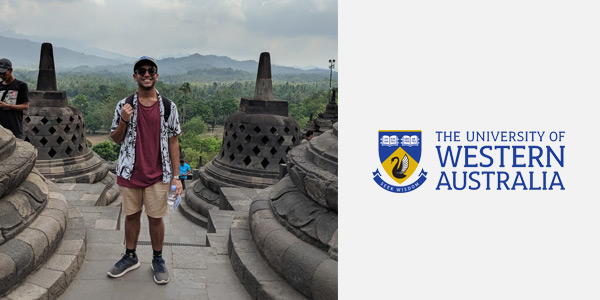Jevin Parmar is a New Colombo Plan mobility grant recipient from The University of Western Australia. Jevin undertook the Public Health Study Tour in July 2019.
Q: Why did you decide to undertake ACICIS’ Public Health Study Tour?
My choice to pursue the PHST was because I wanted to try something outside of my degree and comfort zone. The PHST was also a great opportunity to glimpse the health care system of another country, paired with an immersive experience into Indonesia’s rich culture.
Q: Did you receive a New Colombo Plan Mobility Grant? If so, how did this contribute to your experience in Indonesia?
Yes, I was fortunate enough to receive the New Colombo Plan Mobility Grant. Without it, I would’ve struggled to meet the requirements to participate on the PHST. The Mobility Grant became a great asset when trying to finance the study tour, allowing me to place my priorities on preparing for the PHST rather than worrying about paying for it.
Q: What did you find to be the most challenging about your experience on the PHST?
The most challenging thing about the PHST wasn’t learning about the uniquely different public health system in Indonesia but was acclimating to the cultural nuances and way of life in Indonesia. Typically, I was used to waking up early and going to sleep around 10pm, but in Indonesia, the way of life is geared towards a later time of day, with markets and shops being open till at least 11pm at night. Although the PHST was only two weeks long, I managed to adjust to the cultural norms quite quickly, but initially had trouble being comfortable with the nuances of their culture.
Q: What public health issues in Indonesia have you become more interested in/aware of as a result of this tour?
As a result of the tour, I was more aware of the effect decentralisation has had on their public health system, particularly the health care services and goods available, which are tailored to each of the numerous islands and areas in Indonesia. I also became aware of the levels of health care in Indonesia, ranging from primary health care at the puskesmas (community health centre) and posyandu (integrated health post) level, to tertiary health care at Type A and B hospitals.
Q: Which was your favourite field trip?
My favourite field trip would have to be the Kali Code walking tour. The tour opened my eyes to a symbiosis between the river community and the river itself, and how the community is making efforts to clean and beautify the river. It was endearing to see these significant efforts, particularly after witnessing the state of living of the individuals in the community.
Q: How do you think the Public Health Study Tour will influence your future career or studies?
The PHST is certainly a steppingstone for me to witness the differences in healthcare provision around the world. It provided a necessary insight into the state of health in Indonesia and what they are doing in terms of prevention and promotion of their most pressing health care issues. The PHST has also influenced the future career path, realising that there is more to providing health care than meets the eye, particularly at the level of primary healthcare services.
Q: What did you most enjoy about the seminar series?
I enjoyed the diversity of the speakers in the seminar series, coming from different social, religious, and educational backgrounds to give a well-rounded explanation of the most pressing health issues which face Indonesia.
Q: What was your favourite aspect about visiting Indonesia?
My favourite aspect of Indonesia must be the food! In my time on the PHST, I managed to try several new dishes and ingredients I would never have thought to try in Australia. The sheer diversity in cuisines and cooking styles in Indonesia amazed me, and I would definitely return to Indonesia, even if just to try the food.
Another aspect I enjoyed about Indonesia was the hospitality and friendliness of the locals. As part of the PHST, we were introduced to several buddies, and although we only got to know them for a short period of time, the memories created and the knowledge gained will certainly hold a special significance to me.


